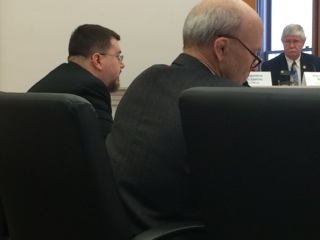
Energy Policy Center analyst Michael Sandoval offers testimony on behalf of Senate Bill 44 before the House Committee on State, Veterans, and Military Affairs on March 2, 2015.
Testimony as prepared:
Testimony on behalf of
SB 44 CONCERNING A REDUCTION IN COLORADO’S RENEWABLE ENERGY STANDARD
March 2, 2015
State, Veterans, and Military Affairs Committee
Mr(s). Chair and Members of the Committee,
My name is Michael Sandoval. I am an Energy Policy Analyst for the Energy Policy Center at the Independence Institute.
Thank you for allowing me the opportunity to testify today on behalf of SB 44.
At the Independence Institute, we are agnostic on energy resources. It is our strong belief that the choice of energy resources should come from the demands of the free market, and not from the preferences of policymakers, lobbyists, or special interest groups.
The goal of the Energy Policy Center is to promote a free market in energy production, where no protections, subsidies, or regulations result in energy winners and losers. We advocate that government remain neutral, which then encourages a level playing field. That is the best way to ensure that consumers reap the benefits of a healthy energy market – where competition, lower prices, and more options provide the foundation for affordable and most importantly, reliable energy.
Testimony
SB 44 affords utilities the flexibility they need to meet electricity demand in the most cost effective way. SB 44 is an energy freedom bill that does not preclude utilities from incorporating wind, solar, or other alternative energy sources in order to achieve a minimum percentage of electricity that electric service providers must generate. Rather it allows utilities to achieve that mix in a way that does not force them to rush to comply in coming years.
SB 44 would eliminate the step-increases mandated by previous legislation that would negatively affect utilities’ ability to respond to customer demands and force ratepayers to contend with ever increasing costs of energy in Colorado.
The most recent numbers from the Energy Information Administration indicate where Colorado sits vis-à-vis its neighbors when it comes to the average retail price of electricity to the residential sector. As of November 2014, Colorado ranks 27th, with a residential retail cost that exceeds that of New Mexico, Wyoming, Nebraska, Montana, Oklahoma, Utah, and Idaho.
According to the Database of State Incentives for Renewables and Efficiency, in 2013 Colorado renewable portfolio standard of 30 percent by 2020 is the highest in the entire Rocky Mountain region, trailing only the west coast state of California.
The Independence Institute believes SB 44 addresses concerns about the state’s market-skewing renewable portfolio standard’s impact upon utilities and ratepayers. The step-change increases in the state’s renewable energy mandate over the course of the next few years will result in higher costs for utilities and ratepayers alike.
These increased costs will likely result in job losses, higher costs for consumers, and a loss of competitiveness for Colorado businesses in comparison to neighboring states without or with lower renewable energy standards. SB 44’S 15 percent figure would bring the state more in line with states throughout the Mountain region.
Again, aligning minimums between investor-owned utilities and cooperative electric associations will level the playing field that will keep electricity rates competitive, but will not prevent individual providers from exceeding those minimums with a market mix of conventional and alternative sources, including wind and solar, that best fits their own market profile and satisfies the needs of their customers.
In conclusion, SB 44 gives utilities the flexibility to adjust power sources as needed and respond to needs of consumers—and not the demands of special interests—from 2015 and thereafter.
Conclusion
As I stated at the beginning it is the strong belief of the Independence Institute that the choice of energy resources should come from the demands of the free market, and not from the preferences of policymakers, lobbyists, or special interest groups and we believe that SB 44 is consistent with that principle.
Thank you.







